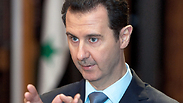
Israeli warnings, attacks won't deter Assad
Analysis: Syrian president operating under influence of Iran and Hezbollah, subject to their mercy.
But these events could lead Israel to a slippery slope, at the end of which it will be dragged into the bloody battle taking place in Syria, and the Golan Heights border line, which has been quiet for 40 years, will become noisy and violent.
Israel's war on the smuggling of weapons must continue, and should be seen as a long-term investment which will save many lives. But like in any investment, it also contains a risk: Israel has a broad basket of tools which gives its leaders flexibility as they select the method of action, in order to allow the other side to be in a "denial area" – in other words, to deny that it was attacked – and to avoid deterioration.
The war on arms smuggling provided two different examples recently: The handling of the Klos-C weapons ship, which allegedly requires dealing with Iran and Syria, and the attack on Hezbollah's weapons convoy – which was attributed to Israel – on the Syria-Lebanon border. Both are loud actions, which it would be hard to conceal. But while the ship's seizure, although it allegedly exposed Iran and Syria, is within both countries' denial area, the operation against the Hezbollah convoy is a different story. Hezbollah is a terror organization whose existence relies on the ethos of resisting Israel, and it is required to respond in order to preserve the ethos, and past examples prove that.
The results of the actions attributed to Israel illustrate, therefore, the need of the military and state's leadership to select the right tool every time, considering the other side's ability to deny – and thereby reducing the risk.
The attack on Syrian targets in response to the explosive charges appears logical: The explosives were planted on the border, Assad cooperated, and so we will punish him to deter him. But this is a move which contains, as I said, a high risk and may get Israel involved in the war in Syria against its will. In addition, it's hard to assume that it will deter Assad, and so it is not expected to deliver the goods either.
If Assad can be deterred, he should be deterred from transferring weapons to Hezbollah – and thereby avoid all the conflicts over the arms smuggling in advance. Yet many messages have been relayed to Assad through messengers in the past, and he chose to ignore them.
The Syrian president has been fighting for his life for more than three years now. His inability to overpower the rebels has led him to a blood alliance with Hezbollah and with Russia. He has lost his independence, and is working first and foremost to survive.
Messages of deterrence or attacks on his army will not deter him, as he is operating under the influence of Iran and Hezbollah and is subject to their mercy.
Israel has many abilities, secret and diverse, that it must use wisely in order to fight the arms smuggling far from the border line and with a reasonable denial area. As for the current round, the right thing would be to contain the event in order to prevent escalation.
Vice Admiral Eliezer Marom was the commander of the Israeli Navy in the years 2007-2011










